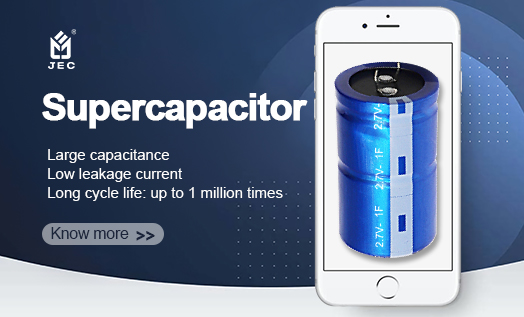Supercapacitor: a new type of electrochemical energy storage element, developed from the 1970s to the 1980s, composed of electrodes, electrolytes, diaphragms, current collectors, etc., with fast energy storage speed and large energy storage. The capacitance of a supercapacitor depends on the electrode spacing and electrode surface area. Reducing the electrode spacing of the supercapacitor and increasing the electrode surface area will increase the capacitance of the supercapacitor. Its energy storage is based on the principle of electrostatic storage. The carbon electrode is electrochemically and structurally stable, and can be repeatedly charged for hundreds of thousands of times, so supercapacitors can be used longer than batteries.
However, supercapacitors can also have problems during operation, such as aging. The aging of supercapacitors changes the electrodes, electrolytes and other supercapacitor components from the physical and chemical properties, resulting in the aging of supercapacitors, causing performance degradation, and this degradation is irreversible.
Aging of supercapacitors:
1. Damaged Shell
When supercapacitors work in a humid environment for a long time, which can easily lead to performance degradation and greatly shorten the working time. The moisture in the air penetrates into the capacitor and accumulates, and the internal pressure of the supercapacitor builds up. In extreme cases, the structure of the supercapacitor casing is destroyed.
2. Electrode Deterioration
The main reason for the performance degradation of supercapacitors is the deterioration of porous activated carbon electrodes. On the one hand, the deterioration of supercapacitor electrodes caused the activated carbon structure to be partially destroyed due to surface oxidation. On the other hand, the aging process also caused the deposition of impurities on the electrode surface, resulting in most of the pores being blocked.
3. Electrolyte Decomposition
The irreversible decomposition of the electrolyte, which greatly shortens the working time of supercapacitors, is another cause of aging. The oxidation-reduction of the electrolyte to generate gases such as CO2 or H2 leads to an increase in the internal pressure of the supercapacitor, and the impurities generated by its decomposition reduce the performance of the supercapacitor, increase the impedance, and cause the surface of the activated carbon electrode to deteriorate.
4. Self-discharge
The leakage current generated by the self-discharge of the supercapacitor also greatly reduces the working time and performance of the supercapacitor. The current is generated by the oxidized functional groups, and the functional groups themselves are generated by electrochemical reactions on the electrode surface, which will also accelerate the aging of the supercapacitor.
The above are several manifestations of the aging of supercapacitors. If the aging of the capacitor occurs during use, it is necessary to replace the capacitor in time.
We’re JYH HSU(JEC) Electronics Ltd (or Dongguan Zhixu Electronic Co., Ltd.), an electronic components manufacturer. Welcome to visit our official website to learn more about our company or consult us for business cooperation.
Post time: Aug-19-2022

